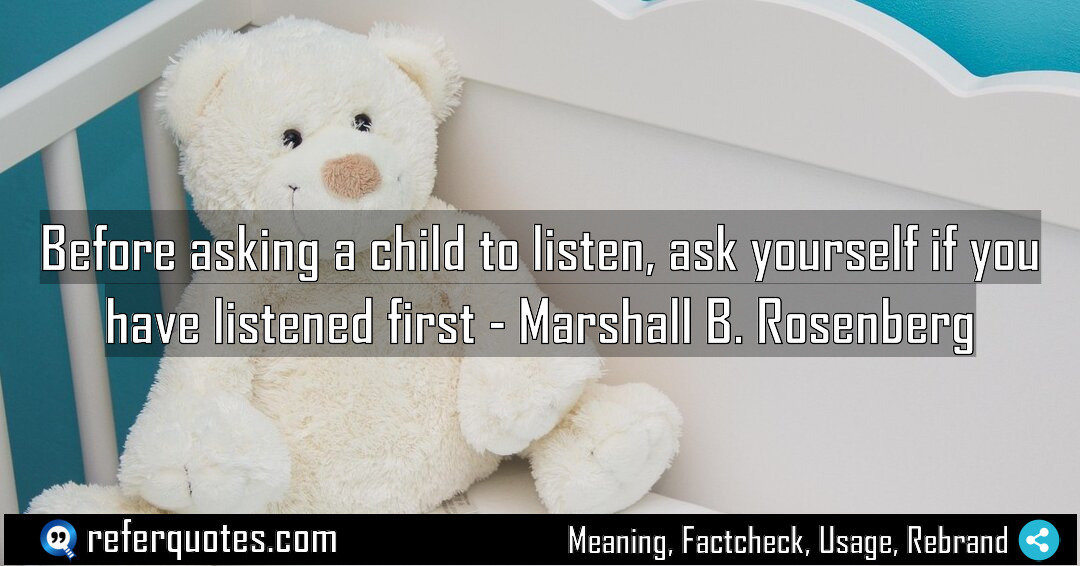
Before asking a child to listen, ask yourself… it’s a game-changing perspective shift. This quote flips the script on traditional parenting, making the adult responsible for the connection first. It’s not about getting compliance, it’s about building a bridge of mutual understanding.
Share Image Quote:
Table of Contents
Meaning
The core message is about modeling the behavior you want to see. You can’t demand respect and understanding from a child if you aren’t first offering it to them.
Explanation
Let me break it down for you. This is where so many of us, myself included, used to get it wrong. We see a child’s behavior, we react, and we tell them to “listen.” But Rosenberg is pointing out a fundamental truth: connection must come before correction.
When you pause and genuinely listen—not just to their words, but to the feelings and needs behind the words—you’re doing two powerful things. First, you’re de-escalating the entire situation. Second, and this is the magic part, you’re teaching them how to listen by giving them the experience of being heard. It’s not a tactic. It’s a complete reframe of the relationship.
Quote Summary
Reading Level69
Aesthetic Score88
Origin & Factcheck
This comes straight from Marshall B. Rosenberg’s 2005 booklet, Raising Children Compassionately. It’s a core tenet of his Nonviolent Communication (NVC) framework. You sometimes see it misattributed to general parenting experts, but its specific phrasing and philosophy are pure NVC, born from Rosenberg’s work in the United States.
Attribution Summary
Where is this quotation located?
| Quotation | Before asking a child to listen, ask yourself if you have listened first |
| Book Details | Publication Year/Date: 2004; ISBN/Unique Identifier: 9781892005140; Last edition: PuddleDancer Press, 1st Edition, 48 pages. |
| Where is it? | Chapter: Listening First, Approximate page from 2005 edition |
Context
In the book, this isn’t just a one-off line. It’s the bedrock. Rosenberg places this self-inquiry as the critical first step before any attempt to guide or set a limit. The whole context is about moving away from a power-over dynamic (“Because I said so”) and toward a power-with partnership.
Usage Examples
So how does this look in the messy real world? Let’s say your kid is having a meltdown because screen time is over.
- Instead of: “Stop crying and listen to me! Time’s up!”
- You try: Kneeling down, “You’re really upset because you were in the middle of that game and you wanted to finish, huh? It’s hard to stop something fun.” (That’s you listening first).
Or, your teenager slams their door.
- Instead of: “Open this door and listen to me right now! We don’t slam doors in this house!”
- You try: Taking a breath, then knocking. “Hey. I heard the door slam. I’m guessing you’re really angry about something. I’m here to listen when you’re ready.”
This isn’t just for parents, by the way. It’s gold for teachers, coaches, and anyone in a leadership role. It’s about human connection.
To whom it appeals?
Share This Quote Image & Motivate
Motivation Score85
Popularity Score80
Shareability Score85
FAQ
Question: Does this mean I let my child walk all over me?
Answer: Not at all. In fact, it’s the opposite. By listening first, you understand the real need, which allows you to set a more effective and connected limit. You’re addressing the root cause, not just the symptom.
Question: What if I’m too angry to listen in the moment?
Answer: That’s the most human question. The quote says “ask yourself.” So if your answer is “No, I’m too furious to listen right now,” the most compassionate thing you can do is be honest. Say, “I’m feeling too upset to talk well right now. I need a minute to calm down, and then I really want to understand what’s going on.” You’re still modeling self-awareness and emotional regulation.
Question: Is this a guaranteed fix for every behavior problem?
Answer: It’s not a magic trick, it’s a practice. It won’t “fix” every single thing instantly. But what it does, over time, is build a foundation of trust and safety. And from that foundation, cooperation grows naturally. It’s a long-game strategy for a better relationship.
Similar Quotes
You know, that idea that every child needs at least one person… it’s so simple, yet it’s the absolute bedrock of development. It’s not about solving their problems, but about…
If you want to be heard, first learn to hear. It sounds simple, but this is the secret sauce for any tough conversation. It flips the script from pushing your…
You know, I’ve seen it a hundred times. Children listen best when they feel respected—it’s a game-changer. It flips the whole script on traditional parenting and gets to the heart…
You know, “Children who are heard grow up to be adults who listen.” It’s one of those simple ideas that completely reframes your entire approach to parenting and leadership. It’s…
When we listen to our children, we teach them a profound lesson that goes far beyond just hearing their words. It’s about validating their entire existence and building a foundation…
